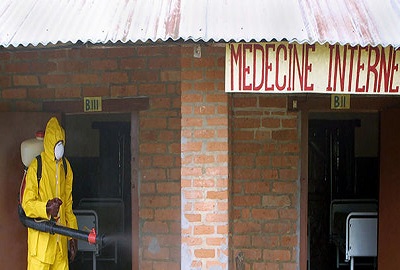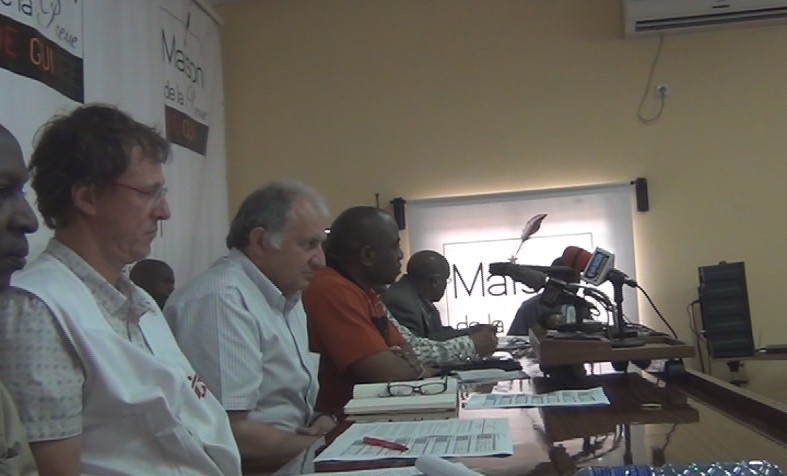Jennifer Lazuta, Special for USA TODAY
2:56 p.m. EDT June 28, 2014
DAKAR,
Senegal — West Africa's first-ever Ebola outbreak in humans is now the
most deadly and geographically widespread outbreak on record and is
threatening to spread, health officials say.
According to the
latest figures from the World Health Organization (WHO), there have been
more than 635 cases of Ebola across three countries in the region since
the outbreak was first declared in southeastern Guinea in March. It has
since spread to Liberia and Sierra Leone. At least 399 people have
died.
"It's very much a serious outbreak," said Daniel Epstein,
spokesperson for the WHO. "I wouldn't say it's out of control, but the
emergence of this outbreak definitely threatens regional public health
security. We've ramped up our response, in so far as we can, but we have
to continue to improve our work to contain this outbreak."
About
150 WHO experts are now on the ground, working alongside local health
ministries and clinics as well as international partners to stop the
transmission chain, prevent new cases and treat those currently
affected.
WHO announced Friday that key players from 11 countries
in the region will meet in Ghana starting Wednesday to discuss the
outbreak, as well as how countries in the region can work together to
step up response efforts.
Many challenges to fighting the virus
have developed, stirring concern the outbreak could get worse because of
ignorance, the free movement of people, local customs and suspicion of
foreigner doctors.
"In some cases, we've had really bad
experiences where we've sent teams of health communicators into
villages: They've been run out of the town, stones have been thrown at
them, they've been threatened with machetes and told to stay away,"
Epstein said.
That's because many people are suspicious of foreign doctors and nurses and often deny the existence of Ebola, he said.
Despite
mass public health campaigns about the dangers of Ebola and the modes
of transmission, many communities continue to practice traditional
burial rituals, which can help spread the virus.
"People come to
say goodbye, they touch the body, they kiss the body, they leave
presents with the body," said Hilde De Clerck, a medical doctor with
Doctors Without Borders who just returned from Guinea. "And since Ebola
is spread through very close physical contact (via bodily fluids, such
as sweat, saliva or blood), people who care for the sick or their bodies
are particularly at risk."
Often, patients who are suspected of
having Ebola will run away from treatment centers, fearing the stigma
that may come along with the diagnosis, health officials say. Other
times, family members who have been in contact with infected individuals
will deny such contact when questioned by health workers, further
complicating the process of cutting off the chain of contamination.
Cross-border
transmission to neighboring countries also remains a concern, as people
continue to travel freely from one country to another, even if sick.
"People
have very big social networks in this region and they often move about,
whether it's for work or to go to the market or to visit family," De
Clerck said. "And since Ebola has an incubation time of up to three
weeks, it means a person can be infected and move around and then fall
sick elsewhere, sometimes quite far away."
Another challenge has
been following up with those who have been potentially infected. For
example, in Guinea's Guéckédou region, where the outbreak first began,
health workers say they must take the vital signs of at least 500 people
each day to make sure they have not become infected. Such efforts
require extensive resources and manpower, which are now stretched thin.
While
experts say these moves have been helping, they have not been enough to
stop or contain the outbreak. Earlier this month, Ebola spread to
Liberia's capital, Monrovia, for the first time and the death toll
across all three countries, particularly in Sierra Leone, continues to
rise.
The United Nations Children's Fund (UNICEF), which has been
launching mass media campaigns and educating people door-to-door to
spread information about the virus since the outbreak first began, says
it's now time for all the countries in the region to work together.
"(This
Ebola outbreak) has always been a critical emergency," said Dr. Maurice
Hours, a health adviser for UNICEF in West and Central Africa. "But now
there is a real danger that it could spread to neighboring countries,
such as the Ivory Coast and Guinea Bissau. We are quite concerned."
http://www.wltx.com/story/news/health/2014/06/28/ebola-outbreak-now-most-deadly-ever-in-west-africa/11626627/











